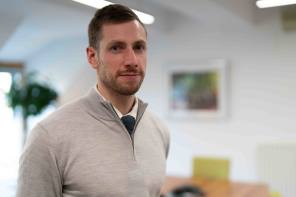

Getting your philosophy set and working with clients you get along with are key to successfully running your own advice business.
This is according to Steven Farrall, one of the names behind Williams Farrall Woodward, who started his career in financial services in the mid-1980s and set up his independent firm in the early nineties on a fee-charging basis.
The independent business, which based in Ipswich, currently has eight members of staff, including three advisers, and 450 active clients.
The firm was set up with Tyrone Woodward and David Williams, the latter of whom still works alongside Farrall.
Farrall chatted to FT Adviser as part of our Coffee Corner series.
What made the firm different from others?
“Well, we've been fee charging since 1995. So where we're different is that we're not financial planners working off a service fee, that’s the commission style.
“And we're not an IFA, we are a genuine service business, servicing clients through time.
“Also our portfolio approach is pretty unique. We don't go, ‘right we are going to make you money’ because we can't.
“If we could do that, we'd be sitting on a beach after doing that for ourselves. So we're trying to stop them losing money, basically.”
Farrall said being a fee-charging business meant being transparent with customers from the start.
He added: “We’ve been completely transparent from day one.
“So clients can then assess whether they think you're delivering what they want for the money they're paying you. And that's the only test of value you can have.”
Farrall added there was a “collegiate approach” to working at the firm, with clients seen as clients of the business rather than of individuals, and where cases are discussed between advisers in the open plan office.
How have you seen the industry change in the past 30 years?
Farrall said when the firm was set up in the early nineties there were few others taking a financial planning approach like theirs.
And these days, the quickly changing political economy played a part in the advice given to clients.
He said: “It is about making sure our clients understand what the problems are out there.
“So increasingly we're having to converge upon the political economy because...the whole thing is in a mess.
“You combine that with the financial planning bit, seeing if you can make this return to get to achieve what you want to achieve.”
How important is choosing your clients?
Farrall said working with clients he gets along with was one of the most important things.
He said the firm turned down clients who they did not think would be a good fit.
“You can’t work with clients you don’t like,” said Farrall.
“We've sacked more clients than we’ve lost, we've done it nicely and we'll find another place to go.
What is the most rewarding aspect of working in financial advice?
Farrall said being able to make people less worried about their finances was all part of the job.
He said: “When you’ve actually made a difference to someone’s life and people have thanked you, that is always nice.
“Some clients have said, you know, look, I don't worry about this because I know you're worrying about it.”
He gave the example of one client who died aged 92, whom he had worked with for almost 30 years.
As well as managing investments, started by her husband who died when the client was 70, Farrall arranged savings for her grandchildren, by putting aside cash at birthdays and at Christmas.
He said: “When one of the kids got to 18 and said ‘what is all this money?’ I could say ‘that’s your granny’.
“His mother said you should thank Steven for getting your granny to do it.”
How easy is it to retain the families of clients?
“The world has changed. People don’t necessarily live in the same area these days and people retire out to places,” Farrall said.
“So it's more difficult to retain these clients, but we do what we can or we will make sure they're going the right way if we can’t.
“But that's been a nice thing to see over my lifetime, to actually see that sort of work is good.”
What would be your advice to someone wanting to start their own business?
Philosophy is key to success when setting up an advice firm, said Farrall.
He said: “Really work on your philosophy and make sure you're absolutely clear what your thinking is about, what you're doing.
“Make sure you're informed and then have principles and be aware your principles will cost you money.
“You should always do the right thing.”
Farrall said doing the right thing meant there should be no need to worry about regulations as the advice should automatically fall within them.
Do you see the need for advice growing?
“This job is becoming increasingly necessary,” said Farrall.
“Anybody with any moderate amount of wealth needs some guidance.”
However, Farrall said providing financial support has become more challenging as more regulation is being rolled out.
He added: “The problem now is regulation is such a burden.
"It is a question of how do we deliver a good support service for people on modest incomes.”
If you own your own advice firm and would like to feature in the Coffee Corner interview series, get in touch at tara.o’connor@ft.com.



